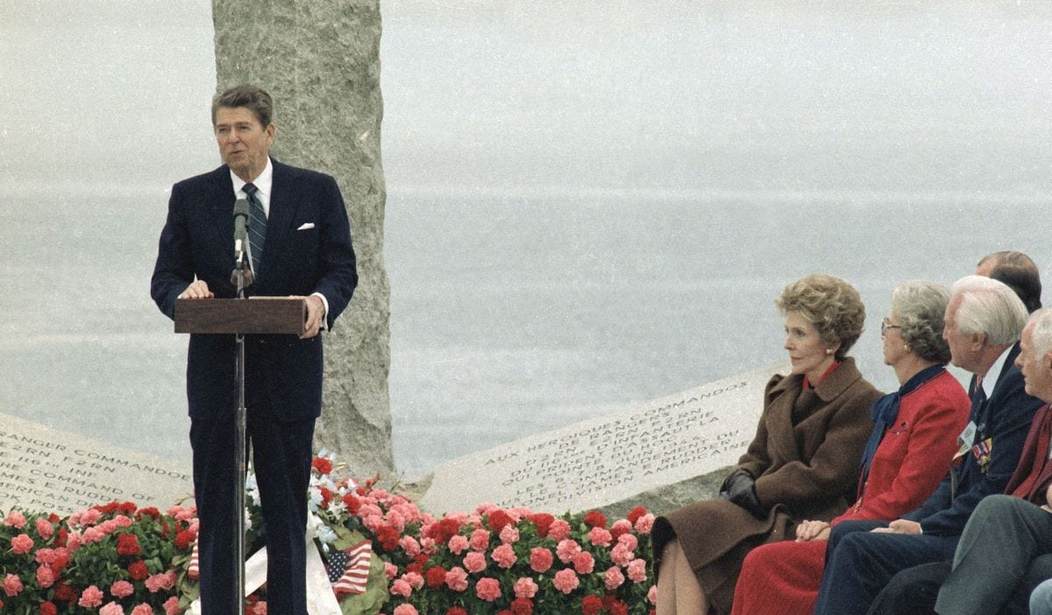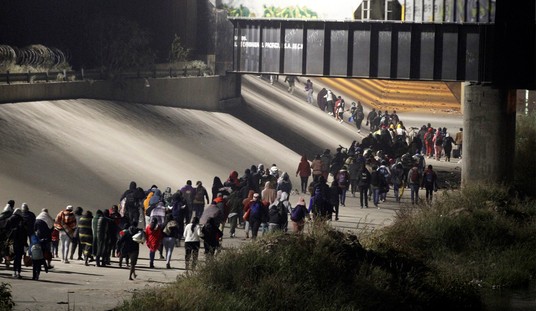This article was originally published in June 2016.
On the 40th anniversary of D-Day, June 6, 1984, Ronald Reagan stepped to the podium on a windswept spit of beach at Point du Hoc.
In front of world leaders, dignitaries, and veterans of that conflict, Reagan delivered what is considered by many to be his finest speech — easily one of the best speeches of the 20th century.
The speech honored the Army rangers who scaled the nearly vertical 130 foot cliff while a withering German fire poured down on top of them. Reagan set the scene and then brought tears to the eyes of most:
The Rangers looked up and saw the enemy soldiers — the edge of the cliffs — shooting down at them with machineguns and throwing grenades. And the American Rangers began to climb. They shot rope ladders over the face of these cliffs and began to pull themselves up. When one Ranger fell, another would take his place. When one rope was cut, a Ranger would grab another and begin his climb again. They climbed, shot back, and held their footing. Soon, one by one, the Rangers pulled themselves over the top, and in seizing the firm land at the top of these cliffs, they began to seize back the continent of Europe. Two hundred and twenty-five came here. After two days of fighting, only 90 could still bear arms.
Behind me is a memorial that symbolizes the Ranger daggers that were thrust into the top of these cliffs. And before me are the men who put them there.
These are the boys of Pointe du Hoc. These are the men who took the cliffs. These are the champions who helped free a continent. These are the heroes who helped end a war.Gentlemen, I look at you and I think of the words of Stephen Spender’s poem. You are men who in your “lives fought for life . . . and left the vivid air signed with your honor.”
The backstory to how the speech came about is of interest to those of us who love a behind-the-scenes look at history in the making. Reagan biographer Lou Cannon relates the story a few days after Reagan’s death in 2004.
Reagan’s performance in Normandy demonstrated the timing, dramatic sense and attention to detail for which the White House staff was famous during his presidency. The French, as hosts of the commemorative events, had wanted Reagan to be welcomed by President Francois Mitterrand before he gave a speech on French soil. But this would have delayed the event until after the morning television shows, conceding them to coverage of the Democratic presidential primary in California on June 5. White House Deputy Chief of Staff Michael Deaver, the maestro of the D-Day production, called in the French ambassador and reminded him that Mitterrand had been warmly received by the president in Washington earlier that year. The French moved up the ceremony to accommodate the U.S. timing.
The power of Reagan’s performance was on display this weekend in television specials across the nation that paid tribute to the 40th president, who died Saturday at 93. Clips from the Pointe du Hoc speech, written by Peggy Noonan, decorated many of these programs. President Bush, tracing similar ground in Normandy at a time when the United States is engaged in a conflict in Iraq, was eclipsed by recollections of Reagan’s celebratory visit. Nor did his staff find the French as accommodating as they were two decades ago. Bush’s commemorative D-Day speech was aired in the United States in the middle of the night.
Few will remember that Ronald Reagan delivered another speech that day. It was given at the Omaha Beach Memorial and was almost equally affecting as his Normandy address.
Reagan visibly choked up during this speech as he read from a letter by Lisa Zanatta Henn relating the gripping story her father used to tell her about how he, Private First Class Peter Robert Zanatta, of the 37th Engineer Combat Battalion — all of 20 years old — hit the beach at Omaha.
“He made me feel the fear of being on that boat waiting to land. I can smell the ocean and feel the seasickness. I can see the looks on his fellow soldiers’ faces — the fear, the anguish, the uncertainty of what lay ahead. And when they landed, I can feel the strength and courage of the men who took those first steps through the tide to what must have surely looked like instant death.”
Private Zanatta’s daughter wrote to me: “I don’t know how or why I can feel this emptiness, this fear, or this determination, but I do. Maybe it’s the bond I had with my father. All I know is that it brings tears to my eyes to think about my father as a 20-year-old boy having to face that beach.”
The anniversary of D-day was always special for her family. And like all the families of those who went to war, she describes how she came to realize her own father’s survival was a miracle: “So many men died. I know that my father watched many of his friends be killed. I know that he must have died inside a little each time. But his explanation to me was, `You did what you had to do, and you kept on going.”’
Overshadowed by Reagan’s greatness at Point du Hoc, this speech also belongs in the pantheon of great rhetorical utterances by an American president.









Join the conversation as a VIP Member